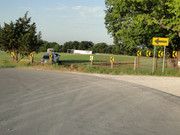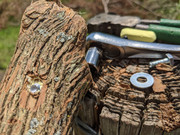Jeanne - Simme Valley
Well-known member
My husband always called that an Okie gate tightener!! No one out here ever saw one before.

Do you know what a "Cockey" is Silver? Property owners out west were referred to as Cockies especially on the big sheep runs in Western Queensland. I think it originated when they were making heaps of money from the wool especially during the Korean war. They thought they were a bit elite and the family set themselves apart from the workers. When I worked in Western Qld outside of Winton there was the " Cockies Club" in town that only the graziers were allowed in or their guests. It used to have an illegal roullette wheel that the local police sargent used to play, proceeds of course to the Royal Flying Doctors. There were several pubs in town but only one that the cockies would drink at, the North Gregory.Silver said:Never heard that called a "gap" before. Interesting the different terminology depending on your location. Here I guess we used our imagination and called the simply a "gate" lol. Had an Aussie here for awhile and he called a wire gate a "Cockey's gate".
The latch that libertygarden shows in her picture is pretty common in these parts. A lot of old harness hames used to be the object of choice for these, but I suppose the scarcity of harnesses these days led to them falling out of favour.


wbvs58 said:Do you know what a "Cockey" is Silver? Property owners out west were referred to as Cockies especially on the big sheep runs in Western Queensland. I think it originated when they were making heaps of money from the wool especially during the Korean war. They thought they were a bit elite and the family set themselves apart from the workers. When I worked in Western Qld outside of Winton there was the " Cockies Club" in town that only the graziers were allowed in or their guests. It used to have an illegal roullette wheel that the local police sargent used to play, proceeds of course to the Royal Flying Doctors. There were several pubs in town but only one that the cockies would drink at, the North Gregory.Silver said:Never heard that called a "gap" before. Interesting the different terminology depending on your location. Here I guess we used our imagination and called the simply a "gate" lol. Had an Aussie here for awhile and he called a wire gate a "Cockey's gate".
The latch that libertygarden shows in her picture is pretty common in these parts. A lot of old harness hames used to be the object of choice for these, but I suppose the scarcity of harnesses these days led to them falling out of favour.
Back to the Cockies gate, I think it coined the term because they would make these rather than spend money on buying a gate. They liked to look after their money. An old Cockie once told me that there were two types of bad payers, ones that paid too early and those that paid too late, meaning you hold onto your money until the limit of the terms of your account but don't get onto the bad debts list. Everywhere they went in town and bought it went onto their account, a bit of a status symbol that they were a Cockie and didn't have to hand over money to obtain things, their credit was good. It also ensured that people were nice to them because they always owed them money.
Ken

libertygarden said:
I have split a lot of locust and red cedar posts. I like the split posts much betterI'm running out of t-posts but there is a lot of hedge in the back of the property where I'm fencing. The question is, should I cut and split a log into staves or should cut 4" posts. I'm not sure if a stave from a thick log will last longer in the ground than a younger post that's only 4" across. Thanks.
We always split them into 6" and bigger so we had to dig a hole. Yes less sapwood is betterThanks Kenny. I kind of figured that they have less sap and more heart wood. Do you pound them into the ground with a sledge?
If you're using hedge (osage orange) it doesn't matter about lasting in the ground. I can show you some hedge post that have been in the ground 75 years that I know of. They do not rot. They are as hard as steel. Trim the trees/limbs so you have 4" or 5" for line post and get as big of one as you can for the corners, and bury the corners deep and if there is a knob where a limb was put that in the ground if you can and it will help hold it.I'm running out of t-posts but there is a lot of hedge in the back of the property where I'm fencing. The question is, should I cut and split a log into staves or should cut 4" posts. I'm not sure if a stave from a thick log will last longer in the ground than a younger post that's only 4" across. Thanks.
Probably be less work to come help me a couple days and we'll load up you truck with second hand tpost.One thing I noticed about hedge posts is that the fire ants like to get into the bark. It doesn't seem to affect the post except if you put your hand on it by mistake.
If you lived closer to me, I'd go just to learn from a pro.Probably be less work to come help me a couple days and we'll load up you truck with second hand tpost.